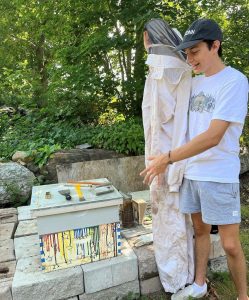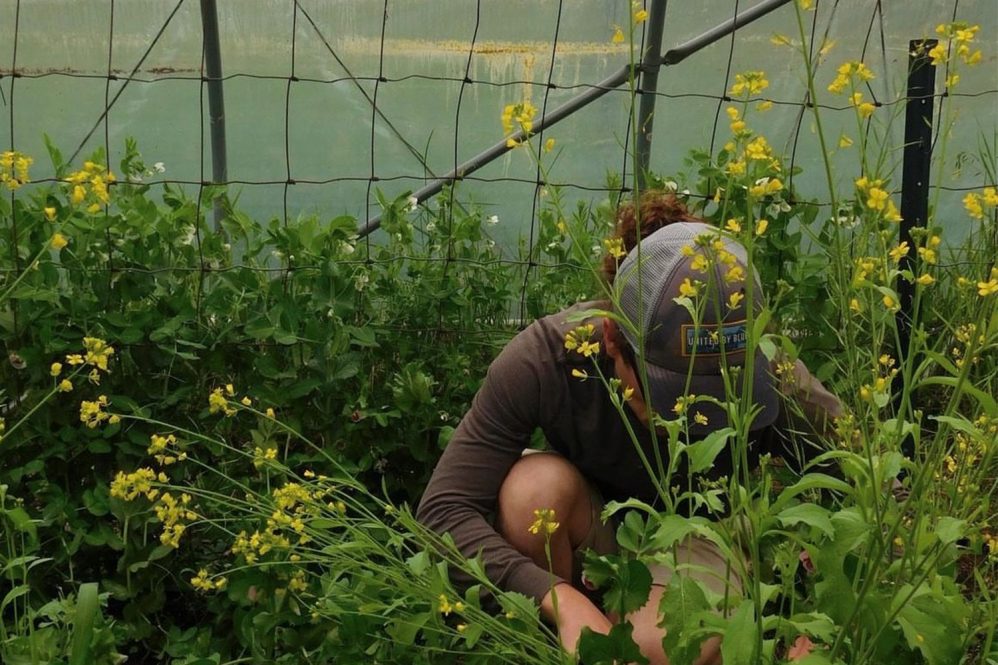On a bright Friday afternoon in late March just as the growing season is about to get underway, UConn’s Spring Valley Student Farm is bustling with activity. Volunteers arrive, eager to help with whatever tasks are on this week’s to-do list, including pruning, seeding flowers to be distributed at the Spring Fling in April, and preparing a new garden bed. Although there is a lot of work to do, the atmosphere is fun and collaborative.

Farm Fridays are an opportunity for students to log volunteer hours and learn about sustainable agriculture, and Isaac Betts ’23 (CAHNR), one of the 11 UConn students who live and work on the farm, says the student farmers learn how to organize and direct the volunteers.
“I started volunteering on the farm in my first year at UConn and have been coming to Farm Fridays ever since except now I’m helping to lead them,” says Betts.
The farm is operated by Dining Services in collaboration with Residential Life and the Learning Communities. Just a short distance from campus, it is a hidden gem that the students want more people to learn about.
“The location of the farm is just so gorgeous. There’s a river and pines on the other side of the valley; it feels like a completely different world that I never thought could exist here,” says Sophia Coppola ’23 (ENG), one of the six student farmers graduating this May.
The students who live on the farm are unanimous — it is a transformative learning experience.

“I love it here,” says Eliza Cochrane ’23 (CAHNR). “I think it’s a great opportunity for people to get engaged with our environment and also help people get to know where their food comes from, and how to grow food for themselves.”
The farmers grow fruits and vegetables organically and provide some of the produce and honey used in campus dining halls.
While living on the farm, students can spearhead new projects and work together to bring them to fruition. Jonathan Dias ’23 (CLAS) says one of his favorite memories from his time on the farm was helping to build UConn’s first-ever ADA-compliant composting privy with fellow farmer Andrew Muller ’23 (CAHNR).
“One day we worked sunrise to sunset, which was nice, and we got a lot done. It was calm and it was a good day to just relax while we did the work. That was a good day.”
Rory Monaco ’23 (CLAS) has enjoyed honing outreach and engagement expertise by running the farm’s social media accounts and learning new skills:
“I wrote the grant for the solar panels on the farm. As an English major, I don’t know anything about engineering, so it was nice to sit in on the meetings and learn about something that I truly have no idea about, it was really fascinating and I’m very grateful for that.”
While living on the farm, the students also learn how to collaborate and make plans for the operation, from what to tackle on the weekly Farm Friday meetup, to decisions that will impact the operation for years to come. Big decisions are made as a group in weekly meetings where everyone can weigh in and lend their unique perspectives and knowledge to the conversation, says Dias:
“We discuss everything that we do as a group and the majority of it we all agree with anyways, it is just the right way to do it.”
Coppola adds, “It’s nice to practice interacting with people and living with people and working through problems. Working through similarities and differences shows me things that I never thought possible. If we all work together, it is possible to accomplish seemingly insurmountable projects.”
One of the projects that Coppola is most proud of is her work on the aquaponics greenhouse, which fell out of commission over the past few years. She has worked to make the system easy for future farmers to learn to operate and maintain for years to come.

The time the farmers have spent in Spring Valley has been filled with much more than just farm-related duties. Cochrane says she will always cherish memories of birding around the property.
“I have learned so much from being here,” she says. “Almost every night, I get to hear great horned owls calling to one another and occasionally, I’ll see a barred owl hanging out in a tree, right before it gets super dark out. I get to come home and then see these magnificent creatures that I love. It’s just so magical.”
Dias, who has gotten involved in as many projects and aspects of the farm as he could, explains that the students run the farm alongside farm manager Jess Larkin-Wells ’19 (CLAS) who also lived and worked on the farm as a student.
“It’s all about collaboration. It makes me feel like I’m actually doing something here,” says Dias.
Monaco adds that, though there is a lot of work to be done day to day, the work was great for letting go of stress.
“Every single time that we have group working hours where we’re all working together, whether it’s weeding, mulching, or planting, it’s just amazing to see how much work gets done when you do it with other people.”
The Farm Friday in March was a testament to that observation, with volunteers and farmers working together and tackling so much within the two-hour block of time. The hardest part may be saying goodbye after graduation, but the farmers will take their memories, skills, and knowledge with them as they move on to the next chapters in their lives.
“I recommend the farm to all of my friends,” says Cochrane, who plans to stay as connected and engaged with the farm as much as possible. “It is the best part of my UConn experience. I call this place home and that’s why I take it very seriously, and why it is so special, it’s a home and a community.”



